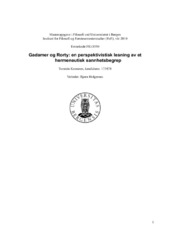Gadamer og Rorty: en perspektivistisk lesning av et hermeneutisk sannhetsbegrep
Master thesis
Permanent lenke
https://hdl.handle.net/1956/4122Utgivelsesdato
2010-05-18Metadata
Vis full innførselSamlinger
- Department of Philosophy [240]
Sammendrag
Dette essayet er organisert rundt spørsmålet om sannhet, hvor Hans-Georg Gadamer og Richard Rortys respektive filosofier leverer premissene og omrisset for diskusjonen. På bakgrunn av disse to kildene, såvel som Nietzsche, Habermas og Richard Bernstein, vil jeg forsøke å skape et sannhetsbegrep i overensstemmelse med hva Gianni Vattimo har kalt samtidsfilosofiens hermeneutiske "koiné". Dette innebærer at jeg anser denne teksten som en selektiv oppsummering og kondensering av syn på sannhet allerede implisitt i filosofiene til de større tenkerne innen forrige århundres filosofi - en forståelse (og fremfor alt en definisjon) av sannhet som på ingen måte forstår seg selv som transcendental, permanent, eller, i siste instans, privilegert. (Noen tanker og metaforer som utvikles i andre halvdel av oppgaven er likevel eksplisitt mine egne kreasjoner, og alle feil implisitt i disse er utelukkende mine egne). Tesens tittel (Gadamer og Rorty: en perspektivistisk lesning av et hermeneutisk sannhetsbegrep) er derivert fra måten jeg vil utføre oppgaven på, ved å starte med Gadamers hermeneutiske sannhetsbegrep, som jeg forsøker å gi en klar og helhetlig fremstilling av i kapittel 1. Etter å ha skissert den uheldige assimileringen av hermeneutikk inn i Rortys ny-pragmatisme, såvel som hans egne oppfatninger om sannhet i kapitlene 2 og 3, forsøker jeg å klargjøre Gadamers filosofi for videre kritikk og forming ved å omfortolke tradisjons-begrepet i kapittel 4. Kapittel 5 befatter seg med konsepter som rasjonalitet, og hvordan et omformet habermasiansk rasjonalitetsbegrep kan få innpass i en filosofi "fordi objektivisme og relativisme", i Bernsteins tekster. I kapitlene 6 og 7 "perspektiviseres" det gadamerske sannhetsbegrep, ved å fusjonere det med et begrep om perspektivisme utformet gjennom et møte mellom Rorty og Nietzsche. Diskusjonen avsluttes, og sannhetsbegrepet oppsummeres og gis sin endelige form i kapittel 8. The following essay is organized around the question of truth, with the respective philosophies of Hans-Georg Gadamer and Richard Rorty supplying the premises and outlining the generel field of discussion. Drawing on these two sources, as well Nietzsche, Habermas and Richard Bernstein, I attempt to create a concept and loose definition of truth in concordance with what Gianni Vattimo has termed the hermeneutic «koiné» of contemporary philosophy. In keeping with this I regard the present text merely as a somewhat selective summary and condensation of views of truth already implicit in the philosophies of the various figures of 20th century hermeneutics - an understanding (and particularly a definition) of truth that by no means understands itself as transcendental, permanent or, ultimately, priviledged. (Nonetheless, certain thoughts and metaphors developed in the latter part of the text are explicitely my own creations, and the faults implicit in these obviously attributable to me alone.) The title of the thesis (Gadamer and Rorty: A Perspectivist Interpretation of a Hermeneutic Concept of Truth) is derived from the manner in which I intend to accomplish the task, by starting with the hermeneutic conception of truth in Gadamer's thought, which I attempt to give full and clear expression to in chapter one. After sketching the unfortunate assamilation of hermeneutics into neo-pragmatism in Rortys writings, as well as the latter's own conception of truth in chapters two and three, I attemp to prepare Gadamers philosophy for further critique and molding by re-interpreting the concept of tradition in chapter four. Chapter five is concerned with intermediary notions such as rationality and the manner in which it can now relate to a philosophy «beyond objectivism and relativism» in Bernsteins texts, after which I dedicate chapters six and seven to the «perspectivization» of the Gadamerian concept of truth - marrying it to a notion of «perspectivism» arrived at through an encounter between Rorty and Nietzsche. The discussion is concluded, and the truth-concept now produced is summerized and given its final form in chapter eight.
Utgiver
The University of BergenOpphavsrett
Copyright the author. All rights reservedThe author
